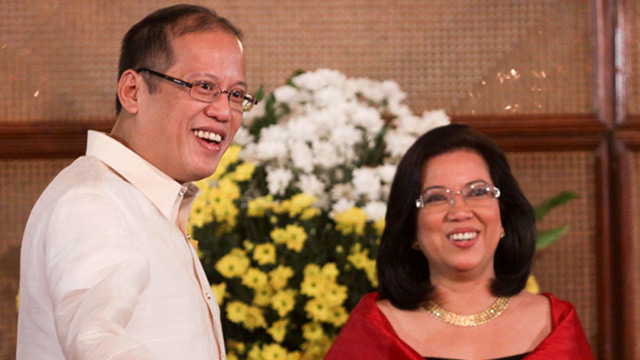SUMMARY
This is AI generated summarization, which may have errors. For context, always refer to the full article.

MANILA, Philippines (3rd UPDATE) – Supreme Court Associate Justice Ma Lourdes Sereno, 52, is the country’s new chief justice. She is the first female chief justice in Philippine history.
President Benigno Aquino III made the appointment Friday, August 24, according to Presidential Spokesman Edwin Lacierda.
Sereno is the 24th chief justice of the country. She replaces dismissed Chief Justice Renato Corona, who was removed from his post on May 29 for failing to disclose P183 million in his statement of assets, liabilities and net worth.
The appointment breaks new ground; it gives the Supreme Court its first female and youngest head in recent history, and is made within the context of a public clamor for more transparency in the judiciary.
Sereno will serve for 18 years as chief justice, until she reaches the retirement age of 70. She bypassed 4 senior SC justices who were also nominated for the post, including Acting Chief Justice Antonio Carpio. The other senior justices on the JBC shortlist submitted to the President were: Justices Roberto Abad, Arturo Brion, and Justice Teresita Leonardo-De Castro. The other nominees were Solicitor General Francis Jardeleza, former San Juan Rep Ronaldo Zamora, and former Ateneo Law Dean Cesar Villanueva.
In a statement, Lacierda said: “In the midst of this period of deep mourning for the loss of Interior and Local Government Secretary Jesse Robredo, the President is cognizant of his constitutional duty to appoint the next Chief Justice of the Philippines. He has therefore decided to appoint Associate Justice Maria Lourdes Punzalan Aranal-Sereno as the 24th Chief Justice of the Supreme Court.”
He added: “The President is confident that Chief Justice Sereno will lead the judiciary in undertaking much-needed reforms. We believe the judicial branch of government has a historic opportunity to restore our people’s confidence in the judicial system.”
According to reliable sources, the President this week — Wednesday and Thursday — met one-on-one with at least 6 nominees for the post: Justices Sereno, Abad, Brion, De Castro, and Carpio, as well as Jardeleza. He did not interview Zamora and Villanueva, according to the same insiders.
Sereno was the first appointee of the President to the High Tribunal. She was named to the SC in August 2010.
Sereno has stirred up the judiciary with her candid disclosure and criticism of the High Court’s inner workings.
But her independence will now be put under scrutiny.
Siding with Aquino
Sereno has voted in favor of the Aquino administration on key political cases. She was tapped as a witness by the prosecution in the impeachment case against Corona, but was barred by the SC from appearing before it.
Sereno also dissented in the majority SC opinion that ordered the distribution of Hacienda Luisita, which was owned by the Cojuangco side of the Aquino family, to farmers. While she voted in favor of land distribution, she pegged the valuation of the land at a higher price.
The decision declared a stock option plan for Luisita farmers unconstitutional and ordered the the distribution of the land among them. It also ordered that just compensation be paid the owners of the over 6,000-hectare sugar plantation.
Six justices voted to base the valuation of the land on Nov 21, 1989, the day the stock option plan was approved.
Sereno and 3 others voted that the valuation be based on the fair market value of the property on Jan 2, 2006, the day Luisita owners were served notice of coverage.
Basing it on the 2006 value would have given the Cojuangcos P10 billion, more than double the amount if the 1989 valuation was used.
Farmer groups had asked Sereno to inhibit from the case, accusing her of being partial.
But she said in her July 20 speech at the IBP forum on the search for the next chief justice that she voted against the Aquino administration in a case filed by Bai Omera Lucman of the National Commission on Muslim Filipinos questioning the constitutionality of Executive Order No.2, which invalidates all “midnight appointments” made by Arroyo. Sereno voted with the majority in issuing a status quo ante order against Lucman.
She also partially dissented in an SC decision upholding the postponement of the elections in the Autonomous Region in Muslim Mindanao from 2010 to 2013. Sereno voted with the majority who ruled that the postponement was valid, but said the President could only appoint an officer in charge for the gubernatorial position.
Dissenter
Sereno defied tradition when she revealed in her Dec 13, 2011 dissent how Corona allegedly blocked the promulgation of her earlier dissent in a case involving former President Gloria Macapagal Arroyo.
In her dissenting opinion, Sereno wrote that Corona’s version of the resolution did not truthfully reflect the High Court’s vote in November 2011, which suspended the implementation of a temporary restraining order (TRO) issued in Arroyo’s favor. Sereno detailed in her dissent that the SC voted 7-6 for the suspension following Arroyo’s non-compliance with one of the conditions attached to the TRO. Corona, in the resolution that was eventually promulgated, wrote otherwise.
Sereno also openly criticized then SC spokesman Jose Midas Marquez. In the same December 2011 dissent, Sereno said Marquez wrongly interpreted the Court’s action. She went on to advise the SC spokesman “not to go beyond his role in such offices, and that [he] has no authority to interpret any of our judicial issuances, including the present Resolution, a function he never had from the beginning.”
It wasn’t the first time that Sereno exposed alleged loopholes in the Court’s procedures and deliberations.
In 2010, she, along with Carpio, said that the Court issued a status quo ante order in favor of then Ombudsman Merceditas Gutierrez even if some of the justices had not yet seen the petition.
When she faced the Judicial and Bar Council last July 27, Sereno said that the appointment of an insider would augur well for the judiciary.
“For an outsider to understand how to manage the agenda of the en banc, nakaka-shock, masyadong specialized (it’s shocking, it’s too specialized),” she said. “Appointing an outsider is like sending a civilian instead of a general to lead a war.
“I hope the public will realize that there are excellent people within the judiciary. Reform and strength can come from within,” she added.
Sereno garnered 6 of the total 8 votes from the JBC.
The council had disqualified the President’s first choice for the post, Justice Secretary Leila de Lima, on account of disbarment complaints filed against her. This prompted the President to say she was not satisfied with the shortlist submitted to him by the JBC but that he would make his choice from the names on the list.
Before SC
Before being appointed to the SC in 2010, Sereno served as executive director of the Asian Institute Management from 2009 to 2010. She served as co-counsel in the government’s case involving the establishment of the Ninoy Aquino International Airport III.
Sereno served as Commissioner and chair of the steering committee in the Preparatory Commission on Constitutional Reform in 1999 and Counsellor to the World Trade Organization Appellate Body in 1998.
She also taught at the UP College of Law for 20 years and did private practice as junior associate in SyCip, Salazar, Feliciano and Hernandez law offices from 1985-1986.
Sereno finished law in UP, valedictorian, and placed 14th in the Bar exams in 1984. For more about her, read this story. – Rappler.com
More in #SCWatch:
- SC must return to ‘dignified days of silence’ – Sereno
- ‘Woman CJ not necessarily pro-woman’
- Next 3 presidents will have Sereno as CJ
- 22 official candidates for Chief Justice
- JBC to interview CJ candidates starting July 24
- 25 accept nominations for chief justice
- Questions for chief justice candidates
- JBC should review process of choosing CJ
- Besides JBC, Palace has judicial search committee
- CONVERSATIONS: How should the JBC choose the next chief justice? #SCWatch
Add a comment
How does this make you feel?










There are no comments yet. Add your comment to start the conversation.